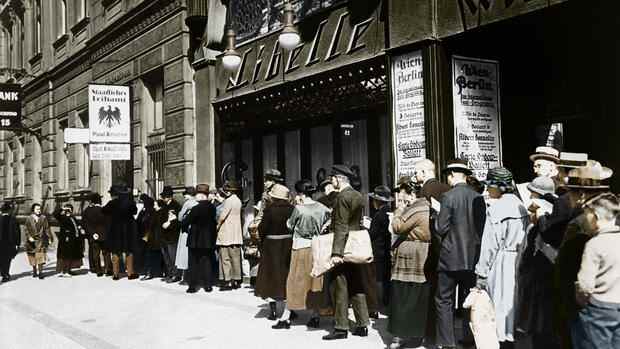After the end of inflation and the introduction of the Reichsmark, many citizens sold their property to exchange for cash.
(Photo: ullstein image)
If an asset manager who studied mathematics and philosophy writes a history book, can it go well? It can. Georg von Wallwitz, founder of the Eyb & Wallwitz asset management company in Munich, has written a wonderful book with “The Great Inflation”.
The subtitle “When Germany was really broke” already reveals that this is not about scare tactics: With the great inflation that peaked in 1923, Germany was “really broke”, today there is no question of that. The author also points out several times that it was not the inflation of the 1920s, but the deflation of the 1930s that fueled the rise of the Nazis. And he shows, using Japan as an example, that high debts and large amounts of money do not automatically cause prices to explode.
Von Wallwitz finished the book last summer. At that time it was already relatively clear that the price increase would pick up significantly in the coming months, but the high percentages had not yet been reached. Either way, the book comes at the right time. Anyone who wants to know what happened 100 years ago with the great inflation that still shapes the collective German memory today, is well served with this work.
The book is convincing at first because it is easy to read and understand. Some passages, for example about the problems of great people changing their minds, may have been a little too long. Some language images, such as the “fathers, mothers and grandparents” and “foster parents” of “inflation”, could have been a bit more economical.
Top jobs of the day
Find the best jobs now and
be notified by email.
But it is gratifying that von Wallwitz always deals with the topic with verve, fluent language and never boringly. You can also tell that he is used to explaining economic issues to laypeople as well. Where necessary, he briefly delves into economic theory.

Georg von Wallwitz: The great inflation.
Berenberg Publishing House
Berlin 2021
256 pages
25 euros
He moves primarily in the quantity theory of inflation, according to which prices are primarily driven by the expansion of the money supply – which is certainly also appropriate in the case of hyperinflation.
At the same time, he indicates the limits of this concept, which is still popular in Germany, with a terse sense of humor: “Even with this theory, reality does not always mean it well.” The author often refers to original sources, but also to earlier works by historians such as Carl- Ludwig Holtfrerich and Gerald D. Feldman. Although it is more of a grand narrative than a scientific book, sources are neatly cited and noted.
The text also gains color through the lively depiction of the people involved. There is the pedantic Reichsbank President Rudolf Havenstein, who out of a German sense of duty had tons of money printed until his death in order to prove himself a loyal subject to the government. Or the ambitious Karl Helfferich, who was both a clever economist and a disgusting hate preacher.
Matthias Erzberger, whom he attests to have failed to implement his major financial reform well, comes off relatively badly with von Wallwitz. Perhaps more appropriate would be the assessment that in the turmoil of the post-war years it was initially no longer realistically achievable.
The reform, which provided the German government with a solid financial basis for the first time, was then likely to have been the prerequisite for overcoming inflation after 1923. The author draws a parallel to the European Union, which, like the imperial government in the emperor’s time, hardly has any income of its own. But he does not mention that the Reich had at least one government and a relatively strong parliament at the time – the EU has so far lacked both.
Ultimately, from Wallwitz’s point of view, inflation is a political phenomenon. The great devaluation of money in the 1920s was not an accident, rather it served to finance the war retrospectively. The alternative would have been high unemployment and an overwhelming debt burden – and thus probably an even earlier collapse of the recently created, still fragile democracy.
More: These are the best books of the year
